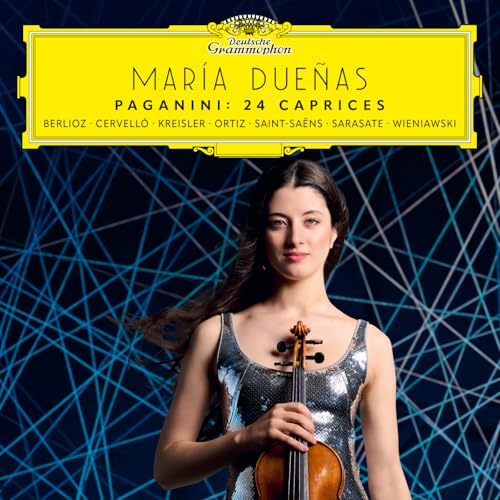
Paganini: 24 Caprices ÔÇö Caprices by Berlioz, Cervell├│, Kreisler, Ortiz, Saint-Sa├źns, Sarasate, Wieniawski




































ÔäŚ┬ę 2025 Deutsche Grammophon GmbH, Berlin
Artist bios
Mar├şa Due├▒as' prowess as a violinist made her an international sensation before the age of 20. After several competition wins, one of which earned the loan of a Stradivarius violin, Due├▒as was signed to the Deutsche Grammophon label in 2022 and issued her debut album there, Beethoven and Beyond, the following year. She is also a composer and chamber musician.
Mar├şa Due├▒as Fern├índez was born on December 4, 2002, in Granada, Spain. Due├▒as began musical lessons in Granada at age five, earning a scholarship from Juventudes Musicales Madrid in 2014 to study at the Carl Maria von Weber College of Music in Dresden. She then moved to Austria to study with Boris Kuschnir at the Music and Arts University of Vienna and the University of Graz. In 2016, her piano piece, Farewell, earned a prize at the Von fremden L├Ąndern und Menschen Competition for Young Composers. The piece was recorded for a short film starring Due├▒as and performed by Evgeny Sinaiski. She has also composed her own cadenzas for concertos by Mozart and Beethoven. Due├▒as won the 2018 Vladimir Spivakov International Violin Competition, which brought with it a Riccardo Antoniazzi violin. Several successes followed, including winning the 2021 Getting to Carnegie Hall Competition and the Viktor Tretyakov International Violin Competition. Perhaps her most notable success also took place that year, when she won first prize and the audience prize at the Yehudi Menuhin International Competition for Young Violinists. With the Menuhin Competition win, Due├▒as was loaned a Stradivarius violin from the private collection of Jonathan Moulds. She also performs on a Nicol├▓ Gagliano instrument from 1734 and the "Camposelice" Stradivarius from 1710.
As a chamber musician, Due├▒as has performed with pianist Itamar Golan, cellist Pablo Ferr├índez, and violinist Renaud Capu├žon, among others. She has appeared as a soloist with orchestras throughout the world, such as the Toronto, Detroit, and Pittsburgh Symphonies, the NDR Elbphilharmonie, and the Orchestre Philharmonique du Luxembourg. She was named a BBC New Generation Artist for the 2021-2023 seasons and is the dedicatee of several works, including solo caprices by Jordi Cervell├│ and Gabriela Ortiz's Violin Concerto "Altar de Cuerda," which she premiered with the Los Angeles Philharmonic and Gustavo Dudamel in May of 2022. That year, Due├▒as signed an exclusive recording contract with the Deutsche Grammophon label and issued her debut there, Beethoven and Beyond, in 2023. Recorded live with Manfred Honeck and the Vienna Symphony Orchestra, the album features Beethoven's Violin Concerto with cadenzas written by Due├▒as. Along with the concerto are works by Kreisler, Saint-Sa├źns, Spohr, Wieniawski, and Ysa├┐e, as well as cadenzas written by those composers for the Beethoven concerto. ~ Keith Finke
The remarkable international career of Niccol├▓ Paganini -- regarded in legend as the greatest virtuoso violinist ever -- did not begin until relatively late in life. Born in Genoa in 1782, Paganini received his first musical instruction from his father, a devoted amateur musician. Niccol├▓'s rapid progress on the violin, however, was such that his father (who was in fact a mandolinist, and thus little suited to train his precocious son) was soon compelled to send his son to Giacomo Costa, maestro di capella of the Cathedral at San Lorenzo, for further study. Although he quickly gained some local fame and even embarked on a minor tour of Italy in 1797, it would be many years before Paganini consented to perform outside his native land.
Paganini began composing seriously after his initial tour of Italy in 1797. He performed little during the initial years of the nineteenth century, preferring instead to devote his time to composition and romance (happily combining the two when he met a Florentine noblewoman, to this day anonymous, with a passion for the guitar). In 1805 he resumed his active musical career, accepting the directorship of the orchestra at Lucca, and in 1813 he embarked on a series of concert tours throughout the Italian peninsula.
In 1825, after nearly 30 years of intensive practice and self-scrutiny, Paganini felt he had developed his skills sufficiently to put them on display for all of Europe, and he left Italy for an extensive European tour (Vienna debut 1828, Paris 1831, London 1831). His astounding technical prowess amazed audiences of the day, and many fanciful legends arose to explain his remarkable abilities (one of the more popular held that he was in league with demonic powers, a legend rather supported by his gaunt, pale features). He died in 1840 from cancer of the larynx, having all but ended his concert career in 1834.
Paganini's impact on nineteenth century music cannot be overestimated: he set an entirely new standard of technical virtuosity; he was among the first musicians to champion the music of Berlioz (having commissioned, but never performed, Harold in Italy); and the inspirational effect that his works would have on the young Franz Liszt -- who set out to duplicate Paganini's achievements on the piano -- would alter both the course of music and the life of the young Liszt forever. Paganini's own compositions, including an unidentified number of violin concertos (some six are extant) and numerous chamber works, have more or less been abandoned. The concertos are written in the Italian operatic style of the day, oscillating between lyric charm and ferocious technical display, and are the only works of his which remain in the repertory (though many of the shorter works, by comparison, are gems and deserve to be played more).
Customer reviews
How are ratings calculated?

